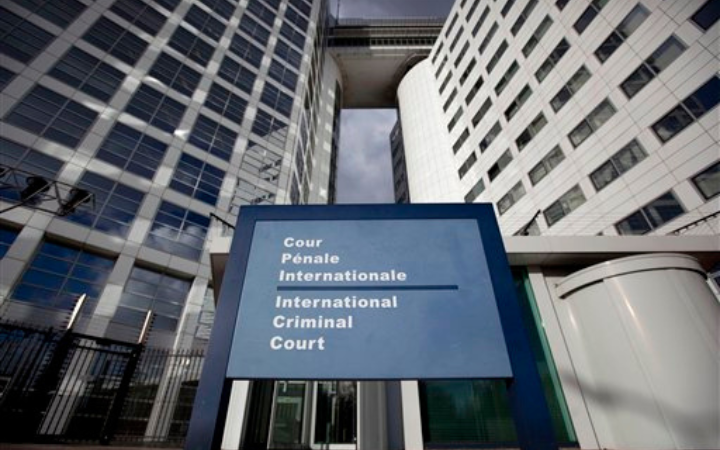
International Criminal Court Building. Peter Dejohn/Associated Press
David E. DeCosse is the director of the Religious & Catholic Ethics program at the Markkula Center for Applied Ethics at Santa Clara University. Views are his own.
In just war theory, the best moral argument for the justification of war is self-defense.
“Self-defense” is the primary standard used in the United Nations Charter. Moreover, self-defense is an intuitively appealing ethical idea: Of course, Ukraine has a right to defend itself against Russia’s neo-imperial land grab.
But the opposite is also true: In just war theory, the worst moral argument for the justification of war is self-defense.
Invoke the imperative of self-defense and you can give yourself permission to respond with crazy force against fearsome, fever-dream threats. We see this perverse logic of self-defense as the so-called right for an individual American to own an AR-15 to defend against … schoolchildren? We also see the idea of self-defense sink toward all-out war in the contemporary belligerence of ethnic and religious nationalism and in the violent, materialist logic of too much postmodern thought.
I thought of this paradox about self-defense in light of the May 20 application by Karim A.A. Khan, chief prosecutor of the International Criminal Court, for warrants for the arrest of Prime Minister Benjamin Netanyahu and Defense Minister Yoav Gallant of Israel and Yahya Sinwar, Mohammed Diab Ibrahim Al-Masri, and Ismail Haniyeh, all top leaders of Hamas.
Khan’s announcement raised many profound issues. And one crucial one is this: As the rules-based international order becomes increasingly frayed, can we preserve the legitimacy of the idea of self-defense in just war theory without letting that idea become an atavistic justification for conquest or slaughter?
Netayanhu called Khan’s announcement a “disgrace” and said Khan was creating an “equivalence” between Israel and Hamas (though the announcement makes no statement or suggestion of an equivalence but affirms its commitment to “apply the law equally”). Netanyahu said of the ICC: “No pressure and no decision in any international forum will prevent us from striking those who seek to destroy us.”
Hamas denounced Khan’s announcement for trying to “equate the victim with the executioner” and re-asserted its longstanding claim of a right to resist Israeli occupation by armed force.
Criticisms of Khan by Israeli and American officials usually fail to mention that in his May 20 announcement he re-affirms Israel’s right to defend itself in the aftermath of the murderous and rapacious Hamas attack on October 7.
But we can see self-defense unmoored in assumptions driving so much of Israeli military policy in Gaza. The outright denial or outrageous slow-walking of essential aid for survival to Palestinians rests on the assumption that the risk of their possible suffering or death is much less important than the threat of trucks bringing in aid as well as military supplies for Hamas. Moreover, Israeli targeting policy consistently has regarded the alleged presence of Hamas operatives in a building as justification for blowing up the entire structure and everyone – Hamas operatives or not – within it.
We see a distorted logic of self-defense in Hamas’ preposterous efforts to justify its wanton murder and rape and hostage-taking of Israeli civilians on October 7 as legitimate resistance against occupiers. The failure to call out Hamas’ “pornography of violence” (as the pro-Palestinian philosopher Seyla Benhabib put it) is a terrible flaw of many progressive encampments on American college campuses.
In the 13th century, St. Thomas Aquinas argued that personal self-defense was justifiable provided that the controlling intention of the person engaged in self-defense was not to kill or harm the attacker but to preserve one’s own life. And, Aquinas added, any such efforts of self-defense must only use a degree of violence necessary to neutralize the attacker and no more. In Aquinas’ formulation, we see a range of values at stake other than visceral self-preservation.
More recently, Jesuit political theorist James Murphy has argued that in the last decades, “just war thought focused too narrowly on the issue of self-defense, assuming that moral permission to use force arises solely from the right of self-defense and that peace is self-evidently the absence of aggression between states.”
To the contrary, Murphy added, the claim of self-defense as a justification for war should be embedded in a broader sense of justice that includes ethical claims like the inalienable dignity of every person; the human rights of all; and the demands of the international common good. Only by situating self-defense within a broader ethical logic can there be a possibility of a just peace that surpasses the mere absence of aggression.
The announcement by Karim Khan is in line with Murphy’s argument and points toward something that we can’t give up on without paying a huge price: A way of thinking about war that binds a claim of self-defense to universal claims of justice. No one should have illusions about the power games and cynicism and bloodlust always in play in these matters. But no one should give up on justice either.